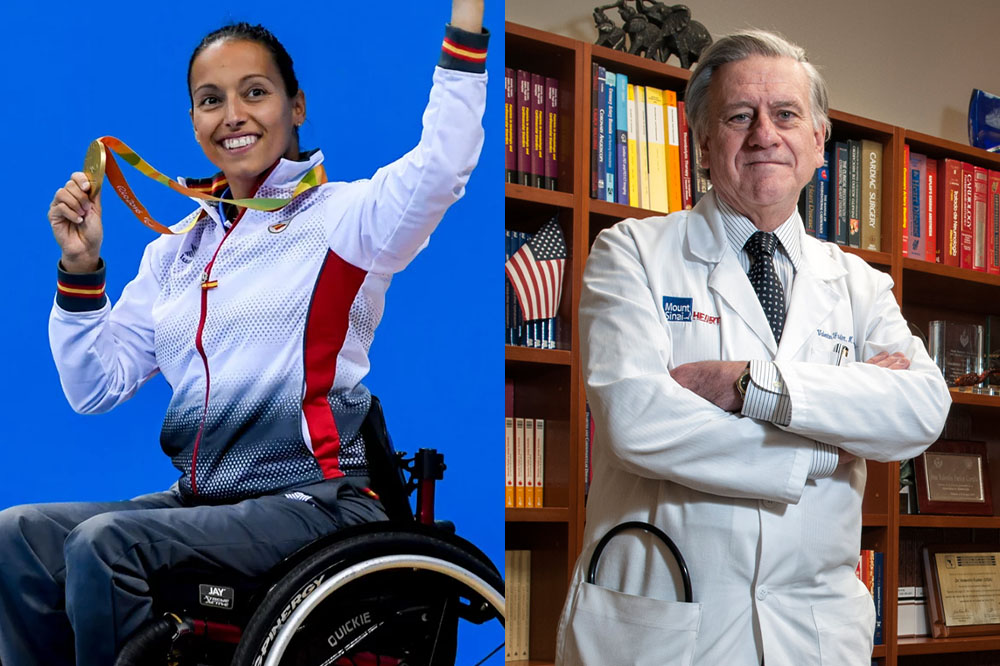What do a world-renowned cardiologist and a Paralympic swimmer with countless international podiums have in common? Valentín Fuster and Teresa Perales embody a type of leadership that goes beyond visible achievements. Both represent an integral approach to leadership, built on three pillars: Being, Becoming, and Recognizing. From self-awareness to their impact on others, their lessons invite us to reflect on what it truly means to lead.
BEING: Leadership begins with authenticity
Being a leader isn’t about holding a position of power. It’s about having a clear understanding of who you are, what your values are, and how you relate to others. Both Fuster and Perales agree that to lead, you must first know how to lead yourself.
Valentín Fuster, one of the most respected cardiologists in the world, explains it clearly: “I don’t believe you can be a good leader if you don’t like people, if you don’t develop empathy, and if you don’t work as part of a team.” According to him, leadership isn’t imposed; it’s built with people. “You lead by example,” Fuster states. If his team starts working at five in the morning, so does he. For Fuster, leadership is first a matter of integrity and closeness, not about dictating orders from a distant office.
Teresa Perales, Spain’s most decorated Paralympic athlete, speaks from a place of resilience. Her neuropathy left her in a wheelchair at 19, but that didn’t stop her from moving forward. Perales emphasizes the importance of not being defeated by circumstances. “You begin to fail when you stop trying,” she says. For her, being a leader means facing challenges without fear of failure, understanding that success starts with a commitment to yourself.
BECOMING: Leaders are forged through effort and perseverance
Leadership is not a starting point but a journey of growth and constant development. Fuster and Perales are prime examples of how leaders are shaped by daily work, continuous learning, and the ability to overcome obstacles.
Fuster, who leads teams in both Madrid and New York and has surpassed the age of 80 while maintaining an intense work routine, insists that surrounding yourself with people who are better than you is key. “Success is about achieving what you can truly accomplish and surrounding yourself with professionals who are better than you,” he says. For him, being a leader means accepting that you don’t know everything but being willing to learn every day.
In Perales’ case, the idea of becoming a leader is intrinsically linked to personal overcoming. After two decades of competition, a shoulder dislocation prevented her from moving her left arm, significantly hindering her performance in the water. However, Perales didn’t let this limitation stop her. She learned to swim with just one arm and, in record time, prepared to compete in the Paris 2024 Paralympic Games, where she won yet another medal. For her, leadership means adapting to circumstances without excuses: “No two athletes are the same, and leadership must adapt to those differences.”

RECOGNIZING: Leaders know how to value and appreciate
The third pillar of excellent leadership is recognizing. A good leader must be aware of their journey and achievements, as well as those of others. Both Perales and Fuster highlight the importance of humility and recognition, not just toward others but also toward life and its opportunities.
Fuster is clear that success is not just the result of individual effort. “Success is about surrounding yourself with people who are better than you, achieving what you can truly accomplish… and recognizing the role of luck in what you’ve achieved.” The prestigious cardiologist doesn’t shy away from acknowledging that luck has played a role in his career, but he also understands that the key is knowing how to seize opportunities when they appear.
Perales shares a similar view, although her personal story leads her to delve deeper into gratitude. “Understanding that your origin doesn’t always determine your destination” is, for her, one of the most important lessons in life. She recalls how her father passed away suddenly, a tragedy that marked her life but didn’t stop her from pursuing success. For her, leadership also involves accepting that life presents you with challenges, and what matters is how you respond to them.
Reflections for leaders of all ages
Both Teresa Perales and Valentín Fuster offer valuable advice to leaders of all generations. During the 20th anniversary of IESE’s Public Leadership Program, they shared their insights with hundreds of alumni, highlighting that excellent leadership is not defined by age or time but by a commitment to personal growth and societal impact.
Perales emphasizes the importance of keeping an open mind and learning from others: “There are always people who can guide us and from whom we can learn.” She also reminded attendees that excellence is a long process that requires constant dedication: “States of peak concentration and professional creativity often only happen after 10,000 hours of training in a pool.”
Fuster, for his part, summed up his vision of leadership with five key points:
- Know and develop your talent.
- Let yourself be guided by your mentors.
- Work within and through teams.
- Make society better with your work.
- Don’t settle for being resilient. Instead, fight, fight, and fight again!
As Perales and Fuster understand it, leadership is not about titles or medals. It’s a journey of self-awareness, effort, and recognition of others. A journey that requires commitment, humility, and, above all, a deep dedication to collective well-being.
In a world increasingly focused on immediate results, these lessons remind us that excellent leadership is about the process, not just the goal. The IESE executive education programs and masters will help you develop the skills needed to become the kind of leader the world truly needs.

















